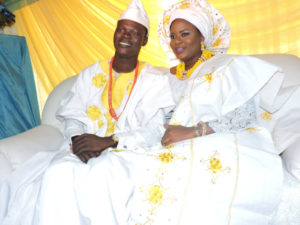Greetings in Contexts
Congratulatory Expressions
Content Objectives
- use appropriate congratulatory greetings in familiar formal and informal situations.
- respond to congratulatory greetings and close conversations in a polite way.
Warm-up Exercise for Classroom Discussion
What are the different occasions or events celebrated in the Yoruba culture? Have you attended any? If yes, what were the expressions you heard that were specifically for that occasion?
Short Reading
Tí ìṣẹ̀lẹ ayọ̀ bá ṣẹlẹ̀ ní ilẹ̀ Yorùbá, a máa ń ṣe àjọyọ̀ tàbi ayẹyẹ rẹ̀. Ayẹyẹ orísirístí tí ó wà ni ilẹ̀ Yorùbá ni ayẹyẹ ìgbeyàwó, ìkómọjáde, ìgbéga, ìkẹ́kọgboyè, òkú àgbà, ìfinijoyè, abbl. Oríṣirísi ìkíni ni a lè fi kí àwọn ẹ̀nìyàn kú óríire. A tún lè ṣe àdúrà tàbí súre fún wọn.
These expressions are suitable in several occasions.
To greet the celebrants and others who were financially involved
(Ẹ) kú ìnáwó (àsìkò e.g. òní, àná, ọjọ́sí)
For instance, (Ẹ) kú ìnáwó àná.
To greet people for turning up
Ẹ kú ìdìde/ìbáṣe
To greet people for celebrating together
A kú àjọyọ̀.
For the success of the celebration
Ẹ kú àṣeyọrí/oríre (add time frame, e.g. òní, àná, ìjẹ́ta).
Dahún ìbéèrè wònyí
Expressions for Specific Contexts
Ayẹyẹ Ìgbéyàwó

Ọjọ́ ìgbéyàwó jẹ́ ọjọ́ ayọ̀ fún gbogbo ènìyàn tí wọn tí ń fi ojú s’ọ́nà. Ẹbí, ará, àti ojúlùmọ̀ máa tí ná owó àti ara. Ìgbéyàwó máa ń dùn gan-an ni. Oríṣiríṣi ìkíni ló lè wáyé.
To wish the couples a fruitful marriage
Ẹ̀yìn ìyàwó kò ní mọ ẹní.
Ìgbéyàwó yìí á so èso rere.
Ìkómọjáde ọmọ titun/ Ìsọmọlórúkọ
Ìsọmọlórúkọ máa ń wáyé ní ọjọ́ kẹjọ. Àwọn ẹbí àti àwọn ọ̀rẹ́ máa ń ṣe àjọyọ̀ fún dídé ọmọ titun náà. Wọ́n sì máa fún ọmọ titun ní orúkọ. A gbọ́dọ̀ lo ìkíni tí ó tọ.
Greetings/expressions

Ẹ kú ewu ọmọ o. (For the safe delivery)
Ẹ kú ọwọ́ l’ómi. (Figurative; greeting alluding to more washing to be done, e.g. babies’ clothes, napkins, etc.)
Ẹ kú ayọ̀ abara tíntín. (Congratulation for the bundle of joy)
Ọlọ́run
á wòó, Ọlọ́run á dasí. (prayers for God to spare the child)
Ọmọ náà á dàgbà, á yanjú. (prayers that the child will grow and be successful)
Ayẹyẹ Ìkàwegboyè/Ìkẹ́kọgboyè
Expressions
(Ẹ) kú oríire o (Generally, congratulations; to the celebrant and their parents or family)
Oyè á mọ́ ọrí o (Specifically to the graduand)
Á fi ṣiṣẹ́ re (It will earn them a good job)
Ayẹyẹ Òkú Àgbà
Yorubas will only do an elaborate event if the deceased died at an old age (65 and above). When it is below 50, it may be a low key celebration of the life and times of the deceased. These greetings are suitable when the deceased was old.
(Ẹ) kú àṣẹ̀yìndè
(Greetings for those celebrating the deceased and upholding their legacies )
Ẹ̀yín wọn á da
(Praying that things will go on fine after their departure)
